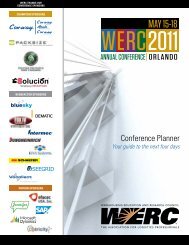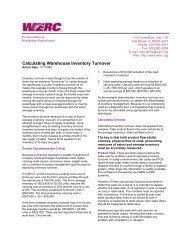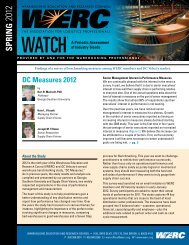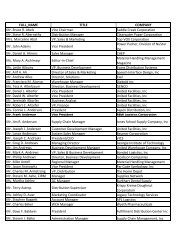Optimizing Inventory Management - WERC
Optimizing Inventory Management - WERC
Optimizing Inventory Management - WERC
Create successful ePaper yourself
Turn your PDF publications into a flip-book with our unique Google optimized e-Paper software.
Stuck in Place continued from page 5<br />
Like the waterways and highways, the FAA also has a<br />
bill in the works to modernize the airway system. “This<br />
would update the air traffic control system,” says Kavinoky,<br />
“as well as help build new runways. This is needed<br />
to keep up with the increases in air traffic.”<br />
All told, there are several key bills that stand in the<br />
way of updating America’s infrastructure. Without their<br />
passage, the supply chain won’t be able to reach its full<br />
potential and may even take steps backward.<br />
Just-in-time, for instance, may become a thing of the<br />
past if the infrastructure isn’t updated. “Inventories will<br />
have to get bigger,” says Kavinoky. “When there are choke<br />
points on the waterways and highways, you have to plan<br />
around it.”<br />
Fuel costs will also rise with the lack of infrastructure<br />
updates, contends Kavinoky. “We’ll be in a situation<br />
where it will be hard to minimize costs,” she says. “You’re<br />
going to be spending more time figuring out how to ‘go<br />
around’ all the choke points, and that will cost money.”<br />
She gives as an example the ports of L.A./Long<br />
Beach. “Why use this congested port when you can go<br />
up to Canada and have your goods move smoothly?” she<br />
asks. “Companies are going to have to look for alternative<br />
and those alternatives will be costly.”<br />
What to do about it<br />
Over the next few years, Kavinoky expects to see<br />
more regulatory issues coming up that will affect the<br />
state of the nation’s infrastructure and the supply chain.<br />
“We need to move from acting in crisis mode to the point<br />
where we get things done,” she explains. “If we don’t have<br />
the infrastructure we need, we can’t compete.”<br />
As logistics professionals, your actions can go a long<br />
way towards getting the nation’s infrastructure updated.<br />
“The longer people are in Washington, the less in touch<br />
they become with the users of these systems.”<br />
To keep Congress in the loop, Kavinoky encourages<br />
people to seek out their representatives and their staff.<br />
“Take the time during recesses to give tours of your facilities’<br />
and explain how the industry works,” she says.<br />
“Demonstrate how connected your business is to the<br />
infrastructure system. There’s nothing like showing your<br />
representatives in person how important this is.”<br />
Also, connect with the U.S. Chamber. The agency<br />
works as your advocate to get the nation’s infrastructure<br />
where it needs to be, doing things like collecting statistics<br />
and presenting them to Congress. “We’re always<br />
looking for businesses to interview and figure out the<br />
best ways to present this to Congress,” Kavinoky says.<br />
“Your challenge is to make sure you are at the table.”<br />
SIDEBAR 2:<br />
AARA Scams<br />
The much touted American Recover and Reinvestment<br />
Act (AARA) of 2009 has funded many<br />
projects to date. However, it has also attracted some<br />
scam artists hoping to capitalize on its name recognition<br />
and the fact that many Americans fail to learn<br />
what exactly the Act entails.<br />
One scam in West Virginia, for instance, involved<br />
a mass mailing to low-income residents offering the<br />
first 50 recipients guaranteed rental assistance. People<br />
showed up at the offices of a fake company and<br />
filled out paperwork revealing social security numbers<br />
and other important identifying information.<br />
In another scam, a website offered Americans<br />
access to a compact disc or another website that<br />
would explain how they could gain access to a<br />
$12,000 government grant, all under the AARA. Some<br />
took the bait and were charged a monthly fee of<br />
almost $70. Other scams have required people to<br />
give up important personal data in order to receive<br />
supposed payouts from the AARA.<br />
In all, scammers have milked thousands of dollars<br />
from the American public under the guise of the<br />
AARA and many who fell for the scams have also had<br />
to clear up identity theft issues.<br />
It regularly sends out updates to members to keep<br />
them in the loop on these issues and show you how to<br />
help influence Congress. “It’s so important that the industry<br />
takes an interest in our infrastructure,” says Kavinoky.<br />
“Congress can’t hear enough from the business community<br />
on this issue.”<br />
Bringing up issues like port congestion and spelling<br />
out for Congress examples like L.A./Long Beach, where a<br />
solution is to go to Canada, is what can make a difference.<br />
“That information can move mountains,” says<br />
Kavinoky.<br />
The bottom line is that the industry needs to have a<br />
bigger presence in Washington to help push bills like<br />
SAFETEA-LU reauthorization and WRDA to the forefront.<br />
“The time is right now,” says Kavinoky. “It’s the voices<br />
from outside of Washington that count.”<br />
Copyright © 2010, <strong>WERC</strong>. All rights reserved.<br />
U.S. Chamber of Commerce, www.uschamber.com<br />
/ September–October 2010 9







